How to cook hard-boiled eggs properly
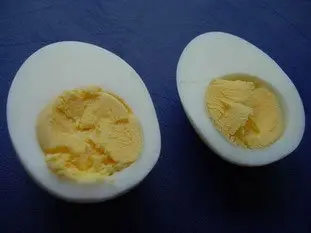
A hard-boiled egg is properly cooked when: shell is not broken, white and yolk are firm, yolk is only yellow with no traces of green around it. Here are some tips to make this easy.
Last modified on: November 4th 2013
For 8 eggs, you will need:
Times for this recipe
Preparation: 8 min.
Resting: 1 hour 10 min.
Cooking: 10 min.
All in all: 1 hour 30 min.
If you start now, at , you will finish around : ?.Change start time
To finish around 7pm, you'll need to have started before: .Change end time
Step by step recipe
Stage 1 - 1 hour
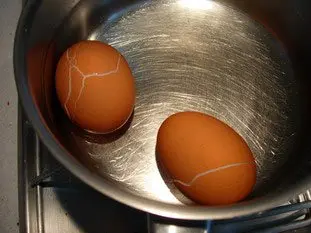
First problem: how to prevent shell from breaking (as in this photo) and white spilling out into the water while cooking?
Egg shells break during cooking for two reasons:
1) Temperature difference, if they go straight from the fridge to boiling water, the shell always (or nearly always) breaks.
Solution: remove your eggs from the fridge at least one hour before cooking.
Note : Eggs don't need to be kept in the fridge.
Egg shells break during cooking for two reasons:
1) Temperature difference, if they go straight from the fridge to boiling water, the shell always (or nearly always) breaks.
Solution: remove your eggs from the fridge at least one hour before cooking.
Note : Eggs don't need to be kept in the fridge.
Stage 2

2) Because in the bottom part of the egg, the broader end, there is an air pocket (in red on the diagram), and when cooking this air expands and eventually breaks the shell.
You will notice that the older the egg is, the bigger the air pocket, so the risk of the shell breaking is greater with an old egg than a fresh one.
You will notice that the older the egg is, the bigger the air pocket, so the risk of the shell breaking is greater with an old egg than a fresh one.
Stage 3 - 1 min.
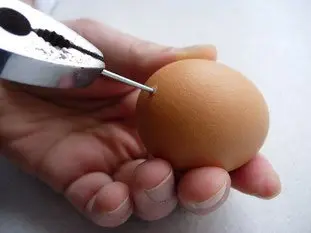
Solution: You need to pierce the air pocket so that the air can escape during cooking.
To do this you can use big needle or a small nail (as in the photo), push in it a few millimetres.
To do this you can use big needle or a small nail (as in the photo), push in it a few millimetres.
Stage 4
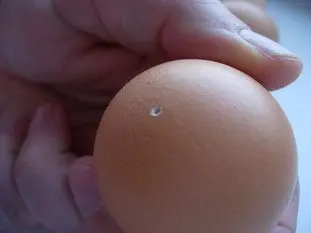
The aim is to just pierce the air pocket and to make a very small hole.
Stage 5 - 10 min.
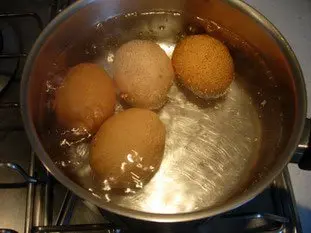
Boil a pan of water, and lower in your pierced eggs gently, using a tablespoon.
Leave to cook 10 minutes, no more.
Leave to cook 10 minutes, no more.
Stage 6
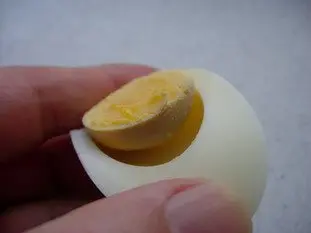
If eggs cook longer, yolks will became yellow-green (as in this photo), and develop a sulphurous taste and smell, and white will become rubbery.
Stage 7
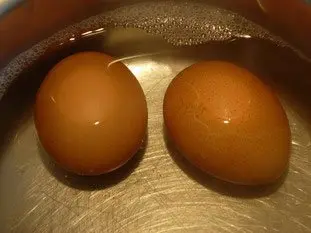
To demonstrate the effect of piercing: on left a pierced egg (shell intact), on right an un-pierced egg (shell broken).
Stage 8 - 10 min.
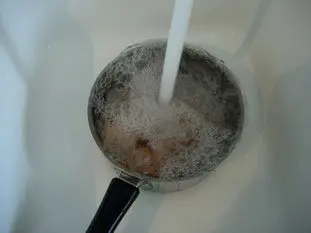
Cool eggs immediately by putting them into cold water.
Stage 9
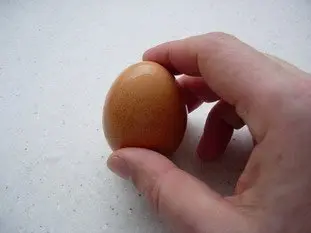
To remove the shell, tap the bottom of the egg on your work surface to break it.
Stage 10
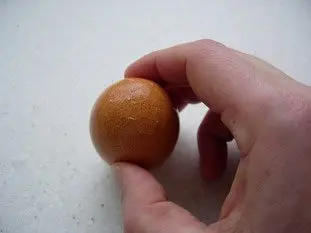
Do the same with the top of the egg.
Stage 11
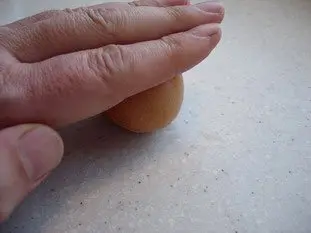
Roll the egg round with your hand to break all the shell.
Stage 12 - 5 min.
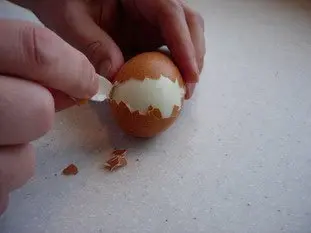
Then remove the shell, as if peeling the egg.
Stage 13 - 2 min.
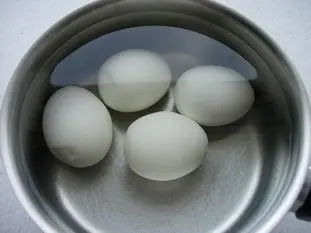
Wash the egg to remove any small pieces of shell, and leave in cold water, or covered in the fridge, until using.
Stage 14
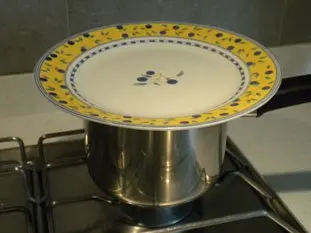
Another way to cook, probably priceless: Fill the pan with cold water to submerge the eggs (drilled) and bring to boil.
When boiling is reached, cover, remove from heat and let stay for 10 minutes.
When boiling is reached, cover, remove from heat and let stay for 10 minutes.
Remarks
Gaston Lenôtre, in his books, say that boiling water for eggs should be salted and vinegared. Probably because egg shells are porous, and so that salted water can salt the egg when cooking?
I've tried it, but I don't taste a real difference. What about you?
I've tried it, but I don't taste a real difference. What about you?
Keeping: A few days in the fridge, in a closed jar.
Source: Home made.
Nutritional information
| Proteins (gr) | Carbohydrates (gr) | Fats (gr) | Energy value (in k-calories) | Energy value (in k-joules) | |
|---|---|---|---|---|---|
| Whole recipe | 50 RDI=20 % | 1 RDI=0 % | 40 RDI=6 % | 580 RDI=30 % | 2,450 RDI: 30 % |
| Per 100 g | 10 RDI=5 % | 0 | 10 RDI=2 % | 150 RDI=7 % | 610 RDI: 7 % |
| Per eggs | 6 RDI=2 % | 0 | 5 RDI=1 % | 70 RDI=4 % | 310 RDI: 4 % |
How much will it cost?
- For 8 eggs : 1.20 €
- Per eggs : 0.15 €
Note: Be careful, these prices are only an estimate, you can consult the table of prices by ingredients used for this estimate.
Some other recipes using this recipeSee them all 47
Rice and purple-sprouting broccoli salad
Like a classic rice salad, but with the crunch of purple-sprouting broccoli.
32 K 15 min.
Bistro-style cabbage salad
This salad, inspired by French bistro cuisine, combines cabbage with fried potatoes and lardons, and hard-boiled eggs in a vinaigrette dressing.
30 K 40 min.
Green avocado salad
This salad is all green and fresh, with diced avocado, lettuce, spring onion and the softness of pieces of hard-boiled egg. The flavour is brought out further with a lime and olive-oil dressing, pepped up with a touch of Tabasco.
69 K 30 min.
Leeks in vinaigrette
A classic dish of French family and bistro cooking. It's both simple and good. The secret lies in cooking the leeks until they are only just tender, so that they keep their lovely green colour. The special vinaigrette includes herbs and hard-boiled eggs.
190 K4.3 45 min.
Green and red salad with sardines and eggs mimosa
This colourful salad combines green lettuce, rosy beetroot, the flavour of eggs mimosa and sardines, and crunchy croutons.
33 K 30 min.
This recipe uses (among others)

Egg
Like these other recipes: Clementine cake, Cheese tart, "Moelleux" cake batter, Chocolate mug cake, Santiago Cake, ... See them all 238
Other recipes you may also like
Pear tart with almond cream
This is a very quick and easy tart to make, as everything (or almost) can be done in advance. A piece of sweetcrust pastry, some almond cream and pears? You have "everything you need". March 17th 2011373 K4.3 1 hour 15 min.
Financiers
This delicious little cake gets its name from its shape, in the form of a gold ingot. April 14th 2020341 K 24.6 20 min.
Special small breads
When you are have mastered the basic leavened bread, you certainly ought to try special breads: with nuts, cheese, seeds, etc... Here is a series of recipes, based on traditional leavened bread. October 13th 2010397 K4 6 hours 30 min.
Preserved tomatoes
Softer than dried tomatoes, they can be used as a kind of chutney in pasta dishes for instance, or simply served to accompany an aperitif. February 21th 2011352 K4.8 5 hours 6 min.
French baguettes
This classic of French baking is rather different from the recipe for leavened bread, it's a question of making a good crust and light crumb along the whole length. To succeed, you should know that there are two secrets: water first of all (much more than for normal bread), and the working of the dough, which is also very different. October 24th 20171.10 M 364.7 5 hours 6 min.
News list of cooking-ez.com
Sign up to receive the latest recipes (next batch due to be sent on 2025-09-14)
Note: We'll never share your e-mail address with anyone else.
Follow this recipe (as 6 people already do)
If you are interested in this recipe, you can "follow" it, by entering your email address here. You will then receive a notification immediately each time the recipe is modified or a new comment is added. Please note that you will need to confirm this following.
Note: We'll never share your e-mail address with anyone else.
Alternatively: you can subscribe to the mailing list of cooling-ez.com , you will receive a e-mail for each new recipe published on the site.
 8
8 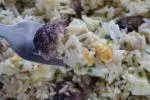

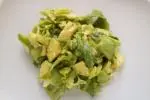







The 6 comments already posted on this recipe
pierce the eggs. Maybe they will shell easier.
This is true in countries that do not wash eggs but in countries that do eggs must be kept refrigerated.
The washing process strips away the natural protection of the egg.